| Listing 1 - 8 of 8 |
Sort by
|
Book
Year: 1956 Publisher: Berlin : Akademie-Verlag,
Abstract | Keywords | Export | Availability | Bookmark
 Loading...
Loading...Choose an application
- Reference Manager
- EndNote
- RefWorks (Direct export to RefWorks)
Demeter (Greek deity) in literature. --- Women and literature --- Aristophanes. --- Galen.
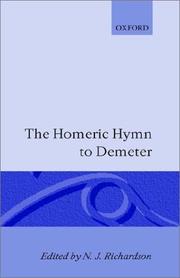
ISBN: 0198141998 Year: 1979 Publisher: Oxford : Clarendon Press,
Abstract | Keywords | Export | Availability | Bookmark
 Loading...
Loading...Choose an application
- Reference Manager
- EndNote
- RefWorks (Direct export to RefWorks)
Homeric hymns --- -Demeter (Greek deity) in literature --- Hymns, Greek (Classical) --- Demeter (Greek deity) in literature. --- Hymn to Demeter. --- Homeric hymns. --- Demeter (Greek deity) in literature --- Demeter (Greek deity) --- Poetry --- History and criticism --- Homeric hymn to Demeter --- Hymnos eis Dēmētra --- Inni omerici --- Homērikoi hymnoi --- Hymni Homerici --- Poetry. --- History and criticism.
Book
ISBN: 3515051260 9783515051262 Year: 1987 Volume: 1987/13 Publisher: Wiesbaden: Steiner,
Abstract | Keywords | Export | Availability | Bookmark
 Loading...
Loading...Choose an application
- Reference Manager
- EndNote
- RefWorks (Direct export to RefWorks)
Erysichthon (Greek mythology) in literature --- Demeter (Greek deity) in literature --- Callimachus --- Callimachus. --- Kallimakh --- Kallimachos --- Kālīmākhūs al-Qūrīnī --- Qūrīnī, Kālīmākhūs --- Calímaco --- Callimaco --- Kallimach --- Callimaque --- Καλλίμαχος --- Demeter (Greek deity) in literature. --- Erysichthon (Greek mythology) in literature. --- Callimachus Cyrenaeus --- Kallimachus --- Kallimachos van Kyrene --- Callimaque. Erysichthon. --- Callimachus van Cyrene. Erysichthon.
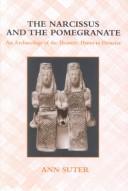
ISBN: 047211249X Year: 2002 Publisher: Ann Harbor (Mich.) : The University of Michigan Press,
Abstract | Keywords | Export | Availability | Bookmark
 Loading...
Loading...Choose an application
- Reference Manager
- EndNote
- RefWorks (Direct export to RefWorks)
Demeter (Greek deity) in literature --- Goddesses, Greek, in literature --- Hymns, Greek (Classical) --- -Persephone (Greek deity) in literature --- History and criticism --- Persephone (Greek deity) in literature --- Hymn to Demeter. --- Homeric hymn to Demeter --- Homeric hymns. --- Hymnos eis Dēmētra
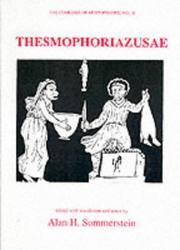
ISBN: 0856685593 9780856685590 Year: 2015 Volume: 8 Publisher: Warminster : Aris & Phillips,
Abstract | Keywords | Export | Availability | Bookmark
 Loading...
Loading...Choose an application
- Reference Manager
- EndNote
- RefWorks (Direct export to RefWorks)
Political satire --- Demeter (Greek deity) in literature --- Athens in literature --- Greek drama (Comedy) --- Criticism, Textual --- Aristophanes. --- Aristophanes --- Humor --- Greek drama (Comedy) - Criticism, Textual --- Aristophanes. - Thesmophoriazusae --- Aristophanes - Humor --- Théâtre (genre littéraire) grec --- Traductions.
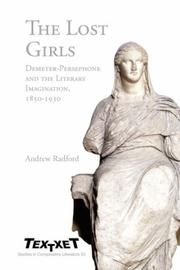
ISBN: 1282265415 9786612265419 9401204667 1435611934 9781435611931 9042022353 9789042022355 9042022353 9789042022355 9781282265417 6612265418 9789401204668 Year: 2007 Publisher: Amsterdam New York Rodopi
Abstract | Keywords | Export | Availability | Bookmark
 Loading...
Loading...Choose an application
- Reference Manager
- EndNote
- RefWorks (Direct export to RefWorks)
The Lost Girls analyses a number of British writers between 1850 and 1930 for whom the myth of Demeter’s loss and eventual recovery of her cherished daughter Kore-Persephone, swept off in violent and catastrophic captivity by Dis, God of the Dead, had both huge personal and aesthetic significance. This book, in addition to scrutinising canonical and less well-known texts by male authors such as Thomas Hardy, E. M. Forster, and D. H. Lawrence, also focuses on unjustly neglected women writers – Mary Webb and Mary Butts – who utilised occult tropes to relocate themselves culturally, and especially in Butts’s case to recover and restore a forgotten legacy, the myth of matriarchal origins. These novelists are placed in relation not only to one another but also to Victorian archaeologists and especially to Jane Ellen Harrison (1850-1928), one of the first women to distinguish herself in the history of British Classical scholarship and whose anthropological approach to the study of early Greek art and religion both influenced – and became transformed by – the literature. Rather than offering a teleological argument that moves lock-step through the decades, The Lost Girls proposes chapters that detail specific engagements with Demeter-Persephone through which to register distinct literary-cultural shifts in uses of the myth and new insights into the work of particular writers.
Literature. --- Persephone (Greek deity) in literature. --- Belles-lettres --- Western literature (Western countries) --- World literature --- Philology --- Authors --- Authorship --- Persephone --- Demeter --- Kore --- Parsefuna --- Persefona --- Persefone --- Persefono --- Pertsefone --- Persefoneh --- Perusepone --- Perszephoné --- Perzefona --- Poersaifunie --- ペルセポネー --- פרספונה --- 페르세포네 --- Персефона --- پرسفونه --- برسفون --- Περσεφόνη --- Κόρη --- Proserpina --- Demetra --- 得墨忒耳 --- デーメーテール --- דמטר --- 데메테르 --- Деметра --- Дэмэтра --- Дэметра --- دمتر --- ديميتر --- Δαμάτηρ --- Δημήτηρ --- Δήμητρα --- In literature. --- Demeter (Greek deity) in literature.
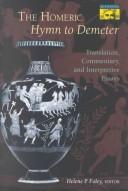
ISBN: 0691014795 0691068437 140084908X 9780691014791 1299788459 Year: 1993 Publisher: Princeton (N.J.) : Princeton university press,
Abstract | Keywords | Export | Availability | Bookmark
 Loading...
Loading...Choose an application
- Reference Manager
- EndNote
- RefWorks (Direct export to RefWorks)
The Homeric Hymn to Demeter, composed in the late seventh or early sixth century B.C.E., is a key to understanding the psychological and religious world of ancient Greek women. The poem tells how Hades, lord of the underworld, abducted the goddess Persephone and how her grieving mother, Demeter, the goddess of grain, forced the gods to allow Persephone to return to her for part of each year. Helene Foley presents the Greek text and an annotated translation of this poem, together with selected essays that give the reader a rich understanding of the Hymn's structure and artistry, its role in the religious life of the ancient world, and its meaning for the modern world.
Hymns, Greek (Classical) --- Demeter (Greek deity) in literature. --- Eleusinian mysteries in literature. --- Demeter (Greek deity) --- Translations into English. --- History and criticism. --- Poetry. --- Demeter (Greek deity) in literature --- Eleusinian mysteries --- Hymnes grecs anciens --- Eleusis, Mystères d' --- Hymn to Demeter. --- Eleusis, Mystères d' --- Eleusinian mysteries in literature --- Poetry --- History and criticism --- Translations into English --- Homeric hymns --- Homeric hymn to Demeter --- Homeric hymns. --- Hymnos eis Dēmētra --- Inni omerici --- Homērikoi hymnoi --- Hymni Homerici --- Traductions anglaises --- Histoire et critique --- Demeter --- In literature. --- Demetra --- 得墨忒耳 --- デーメーテール --- דמטר --- 데메테르 --- Деметра --- Дэмэтра --- Дэметра --- دمتر --- ديميتر --- Δαμάτηρ --- Δημήτηρ --- Δήμητρα --- Ceres --- Hymns, Greek (Classical) - Translations into English --- Hymns, Greek (Classical) - History and criticism. --- Demeter (Greek deity) - Poetry.
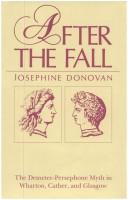
ISBN: 0271006498 9780271006499 0271072563 Year: 1989 Publisher: University Park London Pennsylvania State University Press
Abstract | Keywords | Export | Availability | Bookmark
 Loading...
Loading...Choose an application
- Reference Manager
- EndNote
- RefWorks (Direct export to RefWorks)
A continuation of Josephine Donovan's exploration of American women's literary traditions, begun with New England Local Color Literature: A Women's Tradition, which treats the nineteenth-century realists, this work analyzes the writing of major women writers of the early twentieth century—Edith Wharton, Willa Cather, and Ellen Glasgow.The author sees the Demeter-Persephone myth as central to these writers' thematics, but interprets the myth in terms of the historical transitions taking place in turn-of-the-century America. Donovan focuses on the changing relationship between mothers and daughters—in particular upon the ";new women's"; rebellion against the traditional women's culture of their nineteenth-century mothers (both literary and literal). An introductory chapter traces the male-supremacist ideologies that formed the intellectual climate in which these women wrote.Reorienting Wharton, Cather, and Glasgow within women's literary traditions produces major reinterpretations of their works, including such masterpieces as Ethan Frome, Summer, My Antonia, Barren Ground, and others.
Thematology --- Glasgow, Ellen --- Cather, Willa --- Wharton, Edith --- Demeter (Greek deity) in literature --- Femme (Théologie chrétienne) dans la littérature --- Femmes dans la littérature --- Femmes dans la poésie --- Femmes dans le théâtre --- Moeders en dochters in de literatuur --- Mothers and daughters in literature --- Myth in literature --- Mythe dans la littérature --- Mythe in de literatuur --- Mères et filles dans la littérature --- Persephone (Greek deity) in literature --- Vrouw (Christelijke theologie) in de literatuur --- Vrouwen in de literatuur --- Vrouwen in de poëzie --- Vrouwen in het toneel --- Woman (Christian theology) in literature --- Women in drama --- Women in literature --- Women in poetry --- American fiction --- History and criticism --- Cather, Willa, --- Glasgow, Ellen Anderson Gholson, --- Wharton, Edith, --- Olivieri, David, --- Wharton, Edith Newbold Jones, --- Уортон, Эдит, --- Gouorton, Intith, --- Glasgow, Ellen, --- Glazgou, Ėllen --- Glāzgova, E. --- Glāzgova, Elena --- Katėr, Villa, --- Cather, Willa Sibert, --- Cather, Wilella, --- Catherová, Willa, --- קאתר, וילה, --- Characters --- Women. --- 20th century --- Wharton, Edith Newbold --- Women --- Cather, Willa Sibert --- Glasgow, Ellen Anderson Gholson --- Glazgou, Ėllen, --- Glāzgova, Elena, --- Jones, Edith Newbold --- Kāz̲ar, Vīlā, --- Kāz̲ir, Vīlā, --- کاذر، ويلا --- Mothers and daughters in literature. --- Myth in literature. --- Women in literature. --- History and criticism. --- Demeter --- Persephone --- In literature. --- Characters.
| Listing 1 - 8 of 8 |
Sort by
|

 Search
Search Feedback
Feedback About UniCat
About UniCat  Help
Help News
News